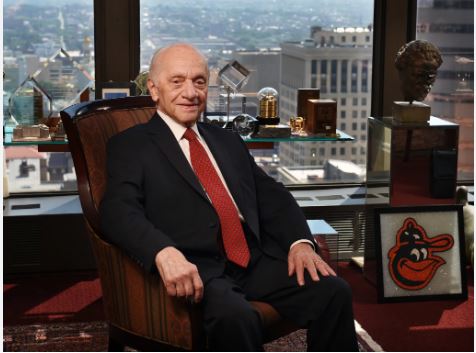
Peter Angelos led a consortium that purchased the Orioles for $173 million in 1993.
The long-awaited sale of the Baltimore Orioles is allegedly underway.
The Angelos family has agreed to sell the MLB franchise to two billionaires, David Rubenstein and Mike Arougheti, for $1.725 billion, according to Puck News’ John Ourand and Sportico.
Rubenstein and Arougheti have both worked in private equity. Rubenstein is a co-founder of the huge Carlyle Group, while Arougheti co-founded Ares Management. Rubenstein, a Baltimore native, will apparently be in charge of the new Orioles ownership group.
According to Ourand, the agreement will give the new group 40% ownership of the club, with the remaining stake sold after patriarch Peter Angelos’ death. Angelos, who bought the Orioles in 1993 as part of a $173 million deal, has apparently been unable to work for several years due to sickness.
MLB’s other owners will learn the official facts of the sale at their annual meeting next week. The purchase is apparently not expected to finalize on a specific date.
Can the Orioles’ new owners support (and fund) their team’s rise?
The Orioles’ sale comes at a key juncture in their history.
/cdn.vox-cdn.com/uploads/chorus_image/image/73103152/97079357.0.jpg)
To many other clubs, the Orioles appear to be in excellent shape. Under general manager Mike Elias, the team has collected one of the most coveted collections of youthful talent in Major League Baseball. That talent includes catcher Adley Rutschman, third baseman Gunnar Henderson, and starting pitchers Kyle Bradish and Grayson Rodriguez, who all contributed to the 2023 team’s 101-61 record and its first division title since 2014.

Even better for the Orioles is what’s to come, since the organization has probably the best farm system in baseball. Jackson Holliday, the first overall pick in the 2022 MLB Draft, is widely regarded as the sport’s best prospect and a future superstar, while MLB Pipeline ranks catcher/first baseman Samuel Basallo (No. 17), outfielder Colton Cowser (19), corner infielder Coby Mayo (30), outfielder Heston Kjerstad (32) and infielder Joey Ortiz (63), all as top-100 prospects. Only the Chicago Cubs have more top-100 prospects than the Orioles, with six.
That all seems like a team in great shape, but the fact that news of this sale will be widely publicized in Baltimore says a lot about the team’s overall situation.
Prior to this sale, it looked that the Orioles’ aim was to win as inexpensively as possible by utilizing all of their youthful talent. Last season, the team’s CBT 40-man payroll was $89.4 million, making it the second-smallest in baseball, and its projected 2024 payroll is $99.3 million, making it third-smallest.
It’s exciting to win with a young and inexpensive club, but it seems doubtful that the Orioles would pay the price necessary to keep all, or even any, of that talent in Baltimore. Last year, controlling owner John Angelos, Peter’s son, caused fans nervous when he was quoted as saying that paying his team’s core would not be “feasible.”
The Angelos family has a well-earned reputation for being cheap and capricious, with recent incidents including the suspension of popular broadcaster Kevin Brown and an attempt to play hardball with the state of Maryland over the beloved Camden Yards.
But unfortunately for the Angelos family, winning a World Series with a bottom-tier payroll is borderline impossible in modern MLB. The Oakland Athletics haven’t done it. The Tampa Bay Rays haven’t done it. Teams such as the Houston Astros and Chicago Cubs, whose salaries bottomed out before they won the big one, only brought home titles after bringing in highly paid players such as Justin Verlander and Jon Lester. Even the 2015 Kansas City Royals ranked in the middle of the pack.
As a result, commitment to future spending, particularly on extensions for players such as Rutschman and Henderson, will be the biggest question this new ownership group faces. Rubenstein being a Baltimore native should inspire hope that he’ll want to spend enough to make the team competitive, but he wouldn’t be the first “fan” owner to go in the opposite direction.
The second question for the new owners is what will happen to the team’s television strategy.
What will happen to the MASN?
Since 2005, the Orioles and the adjacent Washington Nationals have been entangled in the strangest local broadcasting situation in sports.
As part of a deal with the Angelos family, MLB established the Mid-Atlantic Sports Network, which owns the television rights to both teams but is mostly owned by the Orioles. The network has been a legal problem for both teams and the league for more than a decade, with the Nationals accusing the Orioles of underpaying them by tens of millions of dollars.
MASN finally agreed to pay Washington an additional $100 million last year, but only for the 2012–2016 seasons. There is a lot more for MLB, MASN, the Orioles, and the Nationals to figure out, as no one in the situation is satisfied with the existing arrangement, except their lawyers’ bank accounts.
That predicament has posed a significant challenge to both
teams’ projected sales. As a result, new ownership in Baltimore could indicate that negotiations have evolved to the point where Rubenstein and Arougheti feel comfortable investing. It’s also likely that MLB would not approve a sale unless the new owners promised to put this issue to rest.
At the very least, the sale of the Orioles will result in a new face at the MASN negotiation table.
Leave a Reply